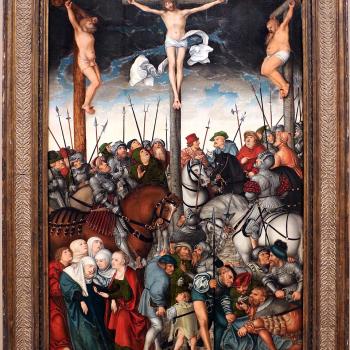
Happy Thanksgiving! The Bible says quite a bit about giving thanks. And it connects thanksgiving with sacrifice.
When ancient Israelites would feel thankful to God, according to the Levitical law, they would offer an unblemished animal “from the herd,” as with the Peace Offering. The animal is slaughtered, the blood is thrown on the altar, and the fat and some of the entrails are burned on the altar. To turn the Peace Offering into a Thank Offering, they would then add loaves of both unleavened and leavened bread. After sharing with the priest, the grateful Israelites would eat the meat and the bread (Leviticus 7:11-15). Once again, as in the Lord’s Supper, the sacrifice culminates in a feast.
I suppose this could be seen as a Biblical warrant for expressing our gratitude to God by eating a big meal. Except leftovers were not allowed: “And the flesh of the sacrifice of his peace offerings for thanksgiving shall be eaten on the day of his offering. He shall not leave any of it until the morning” (Leviticus 7:15).
Throughout the Old Testament, the prophets and the Psalmists exhort the people to be thankful to God and to offer up a sacrifice of thanksgiving. In Psalm 50, though, there is a turn from the ritual to its meaning. The psalmist rebukes his hearers for offering sacrifices while neglecting the truth of God:
“Hear, O my people, and I will speak;
O Israel, I will testify against you.
I am God, your God.
8 Not for your sacrifices do I rebuke you;
your burnt offerings are continually before me.
9 I will not accept a bull from your house
or goats from your folds.
10 For every beast of the forest is mine,
the cattle on a thousand hills.
11 I know all the birds of the hills,
and all that moves in the field is mine.
12 “If I were hungry, I would not tell you,
for the world and its fullness are mine.
13 Do I eat the flesh of bulls
or drink the blood of goats?
14 Offer to God a sacrifice of thanksgiving,
and perform your vows to the Most High,
15 and call upon me in the day of trouble;
I will deliver you, and you shall glorify me.”
The people are told to offer a sacrifice of thanksgiving, but then, later in the Psalm, the terms are reversed.
“The one who offers thanksgiving as his sacrifice glorifies me;
to one who orders his way rightly
I will show the salvation of God!” (Psalm 50:23)
The sacrifice is the thanksgiving! God desires not just thank offerings but a thankful heart, which is what the offering should testify to. And the thankful heart should manifest itself in a rightly ordered life.
We see this pattern also in the New Testament. The author of the Book of Hebrews goes to great lengths in showing that the old sacrificial system is fulfilled and superseded in Christ. Whereupon he brings up a different kind of sacrifice:
Through him then let us continually offer up a sacrifice of praise to God, that is, the fruit of lips that acknowledge his name. Do not neglect to do good and to share what you have, for such sacrifices are pleasing to God. (Hebrews 13:15-16).
Sharing with others and doing good are sacrifices. They entail a denial of self for the good of our neighbors. Praising God–which is what we do when we thank Him–is a sacrifice, because we stop crediting ourselves to recognize the abundant gifts of God.
In that frame of mind, we can give “thanks always and for everything to God the Father in the name of our Lord Jesus Christ” (Ephesians 5). And in doing so, we “present [our] bodies as a living sacrifice, holy and acceptable to God, which is [our] spiritual worship” (Romans 12:1).
Illustration: Burnt offering. The Phillip Medhurst Picture Torah 521. By Philip De Vere, CC BY-SA 3.0 <https://creativecommons.org/licenses/by-sa/3.0>, via Wikimedia Commons
















